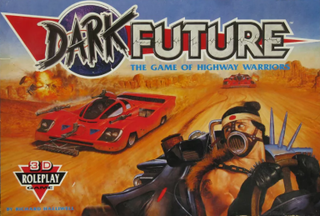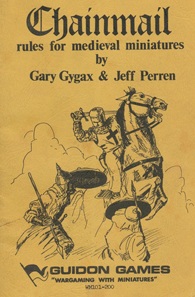Related Research Articles

A wargame is a strategy game in which two or more players command opposing armed forces in a simulation of an armed conflict. Wargaming may be played for recreation, to train military officers in the art of strategic thinking, or to study the nature of potential conflicts. Many wargames re-create specific historic battles, and can cover either whole wars, or any campaigns, battles, or lower-level engagements within them. Many simulate land combat, but there are wargames for naval and air combat, as well.

Warhammer 40,000 is a miniature wargame produced by Games Workshop. It is the most popular miniature wargame in the world, and is particularly popular in the United Kingdom. The first edition of the rulebook was published in September 1987, and the tenth and current edition was released in June 2023.

Games Workshop Group is a British manufacturer of miniature wargames, based in Nottingham, England. Its best-known products are Warhammer and Warhammer 40,000.

Miniature wargaming is a form of wargaming in which military units are represented by miniature physical models on a model battlefield. The use of physical models to represent military units is in contrast to other tabletop wargames that use abstract pieces such as counters or blocks, or computer wargames which use virtual models. The primary benefit of using models is aesthetics, though in certain wargames the size and shape of the models can have practical consequences on how the match plays out.
In tabletop games and video games, a character class is an occupation, profession, or role assigned to a game character to highlight and differentiate their abilities and specializations.

Dark Future is a post-apocalyptic miniatures wargame published by Games Workshop in 1988.

Chainmail is a medieval miniature wargame created by Gary Gygax and Jeff Perren. Gygax developed the core medieval system of the game by expanding on rules authored by his fellow Lake Geneva Tactical Studies Association (LGTSA) member Jeff Perren, a hobby-shop owner with whom he had become friendly. Guidon Games released the first edition of Chainmail in 1971.

Fantasy Flight Games (FFG) is a game developer based in Roseville, Minnesota, United States, that creates and publishes role-playing, board, card, and dice games. As of 2014, it is a division of Asmodee North America.

Flames of War is a World War II tabletop miniatures wargame produced by the New Zealand company Battlefront Miniatures Ltd. The 1st Edition set of rules was published in 2002.
Bryan Charles Ansell was a British role-playing and wargame designer. In 1985, he became managing director of Games Workshop, and eventually bought the company from Steve Jackson and Ian Livingstone. Ansell moved Games Workshop from London to Nottingham and refocussed the company from role-playing games to Warhammer wargame and miniature products, which became very popular.

Andy Chambers is an English author and game designer best known for his work on over 30 Games Workshop rulebooks and sourcebooks.

Rick Priestley is a British game designer and author mainly known as the creator of Warhammer miniature wargame.

Micro armour refers to scale models made of lead, pewter, die cast metal or plastic, usually used for wargaming purposes. Variations of the name include: mini armour, microscale, mini tanks, miniature armour, miniature tanks, micro tanks, minitanks, minifigs, armour figurines, tank figurines, etc. are also used. Micro armour is a sub-category of model military vehicle miniature figures used for military simulation, miniature wargaming, scale models, dioramas and collecting.
Wargames Illustrated is a magazine dedicated to miniature wargaming which is focused on historical tabletop wargames. The monthly magazine has both paper and digital editions and maintains editorial, design and administrative staff in Nottingham, England.

Fire and Fury is a miniatures wargame about the American Civil War.

A wargame is a strategy game that realistically simulates warfare. Wargames were invented for the purpose of training military officers, but they eventually caught on in civilian circles, played recreationally.
Richard Fretson Halliwell was a British game designer who worked at Games Workshop (GW) during their seminal period in the 1980s, creating many of the games that would become central to GW's success.

The lead belt is a name given to part of the English East Midlands, including Nottingham, because of the number of wargames manufacturers based there. A key factor is the location of Games Workshop, the biggest wargames miniature manufacturer in the world. Games Workshop was brought to Nottingham by Bryan Ansell in the early 1980s. Ansell had previously founded Citadel Miniatures at Newark, Nottinghamshire in 1979. Many former Games Workshop staff have gone on to found other manufacturers in the area and the 8—10 companies in the lead belt account for 90% of the British wargames miniature market. Because of the concentration of wargaming businesses the lead belt is the subject of organised tours for wargamers from North America.
References
- 1 2 3 4 Yates, Phil (2007). "Fire and Fury". In Lowder, James (ed.). Hobby Games: The 100 Best . Green Ronin Publishing. pp. 110–112. ISBN 978-1-932442-96-0.
- 1 2 "Flames of War, 4th edition". Wargames Illustrated . No. 352. February 2017. Archived from the original on 2023-11-02. Retrieved 2023-11-02– via Fantasy En'Counter.
- 1 2 Puschmann, Karl (Autumn 2019). "It's a Small World". AA Directions. New Zealand Automobile Association. Archived from the original on 2023-11-02. Retrieved 2023-11-02.
- ↑ S, Antonios (2014-01-08). "Review of Flames of War: Open Fire!". RPGnet . Archived from the original on 2023-11-02. Retrieved 2023-11-02.
- ↑ "Third Tour". Wargames Illustrated . No. 306. April 2013. Archived from the original on 2023-11-02. Retrieved 2023-11-02– via Fantasy En'Counter.
- ↑ "Theme: Never Say Never". Wargames Illustrated . March 2017. Archived from the original on 2023-11-02. Retrieved 2023-11-02– via Fantasy En'Counter.